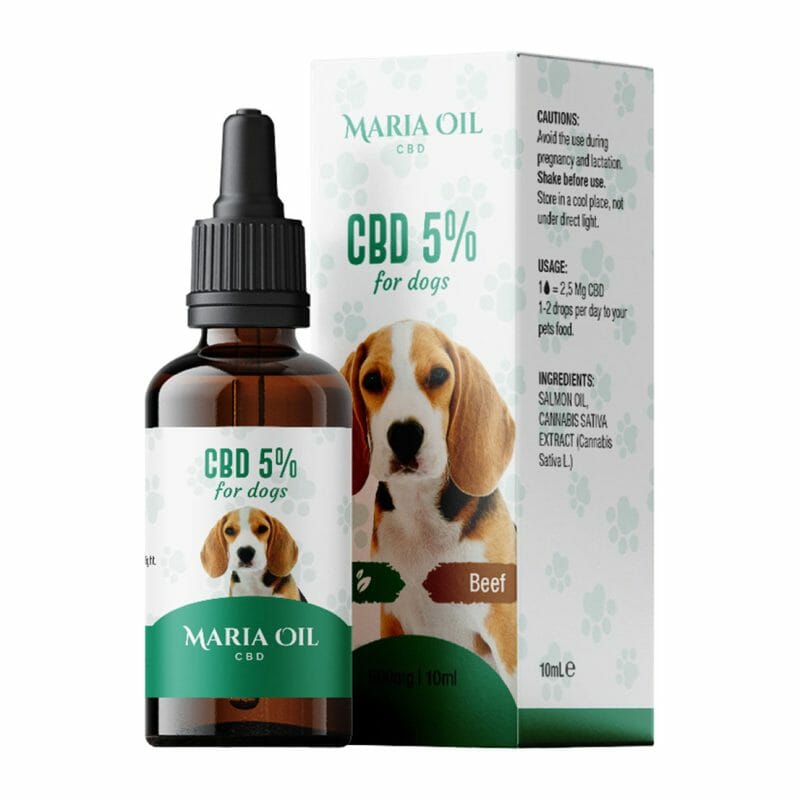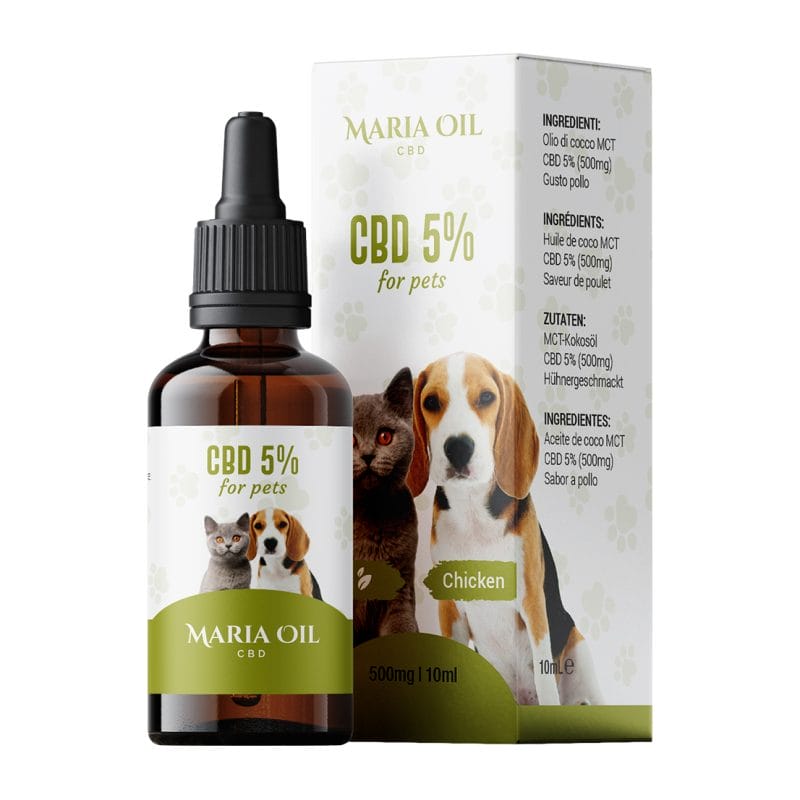Elderly dogs, as the years go by, can manifest a number of age-related problems that require special care and attention. That is why many dog owners are now exploring alternative options to improve their loyal four-legged friends’ quality of life. One of the most recently discussed topics is the use of cannabidiol, commonly known as CBD, as a possible remedy to alleviate certain age-related symptoms in dogs.
CBD is a compound extracted from the cannabis plant which, unlike THC, does not produce psychotropic effects. Over the past few years, much research has investigated the beneficial potential of CBD in treating chronic disorders and promoting general well-being. This tendency has also started to gain popularity among elderly dog owners looking for more natural therapeutic alternatives.
Given the remedy’s innumerable therapeutic properties, we will explore how CBD can be used to treat elderly dogs, focusing on safe approaches and practical advice.
However, before getting into the details of applying CBD to an elderly dog, it is important to understand what CBD is and what are its main effects. We will delve into the science behind CBD and how this compound interacts with the endocannabinoid system in older dogs to see if it can be truly effective.
What are the benefits of CBD for dogs?
Scientists have discovered that CBD provides various potential benefits for dogs, especially the elderly ones, due to its interactive properties with the endocannabinoid system, which is found both in humans and animals.
Here are some of the main advantages:
- Pain relief: CBD is known for its pain-relieving and anti-inflammatory properties, for both chronic and acute pain;
- Anxiety management: it has anxiolytic and relaxing properties that help handle stress resulting from both psychological and physical trauma;
- Improved appetite: CBD has been associated with appetite stimulation, helping follow an adequate diet;
- Supported sleep: the relaxing effects CBD can promote a deeper and more restful sleep, together with its direct action on the sleep-wake cycle;
- Seizure control: CBD proved to have anticonvulsivant effects, making it an option for dogs with epilepsy;
- Improved cognitive functions: CBD has also been studied for its potential to improve brain function, which could be beneficial for older dogs showing signs of cognitive decline.
It is clear that there are many positive reports on the benefits for dogs, but it is always advisable to consult a veterinarian before starting any CBD treatment for older dogs to ensure that it is appropriate for the animal’s specific health and that it is administered safely and correctly.
Is CBD adequate for dogs of all ages?
According to science to date, CBD can be used for dogs of different ages, but it is important to make some considerations.
Generally, it is advisable to avoid the use of CBD in puppies, especially those of smaller breeds. Puppies are developing and may react in a different way to the effects of CBD. Also, research on safety and efficacy of CBD in puppies is limited, so it is best to wait until the dog has reached a certain maturity.
Instead, CBD is usually used successfully in grown-up dogs to alleviate a number of problems that we have already mentioned, such as joint pain, anxiety, stress and other symptoms related to ageing. However, it is essential to determine the appropriate dosage based on the dog’s weight, general health and individual response.
Each dog is an individual and the response to CBD may vary. That is why the dog’s behaviour, health and well-being must be carefully supervised while using the product, adjusting the dosage or discontinuing if necessary.
CBD for elderly dogs does not always replace traditional treatments, but to accompany an existing treatment it is best to seek advice from your vet to avoid unpleasant interactions or cancellation of effects.
If my dog is old, what are the risks?
CBD is generally considered safe for animals, but there are some potential contraindications to keep in mind:
- Interaction with other drugs: it is not a rule, but a possibility that may occur;
- Allergic reactions: the symptoms of an allergic reaction to CBD include itching, redness and swelling;
- Side effects: CBD can generally cause some side effects such as drowsiness, sedation and diarrhoea.
Elderly dogs are more susceptible to the side effects of CBD. The risks of sedation and diarrhoea are greater with advancing age, so it is important to start with a low dosage and increase as needed. Also, elderly dogs can be more susceptible to interactions with other drugs.
Before administering CBD to an elderly dog, it is important to take into consideration the following factors:
- Age of the dog;
- Health status of the dog (older dogs that have other health problems, such as kidney or liver disease, may be more at risk of side effects);
- Medications taken by the dog.
Consulting your vet is very important to ensure that CBD only releases its beneficial effect.
What can be treated with CBD?
CBD has been the subject of numerous studies and testimonies suggesting its beneficial potential in various areas of dog health.
We see some tested conditions from which owners and experts where benefiting:
- Joint pain and arthritis: CBD helps relieve the inflammation and joint pain associated with arthritis, often common in senior dogs;
- Anxiety and stress: has calming effects and can be used to manage anxiety, especially in situations such as thunderstorms or stressful events such as separations or car trips;
- Epilepsy and seizures: may reduce the frequency and intensity of seizures in dogs with epilepsy;
- Gastrointestinal problems: by stimulating appetite and having an anti-emetic action, CBD helps dogs suffering from gastrointestinal disorders;
- Insomnia: the relaxing action can reduce anxiety or pain, which are often triggers for insomnia;
- Age-related complications: can be used to improve the quality of life of elderly dogs by helping to manage age-related symptoms such as cognitive decline, lack of appetite and reduced mobility;
- Cancer: while research is still ongoing, preliminary studies indicate that CBD may have anticancer properties and help mitigate some symptoms associated with cancer.
It is important to be aware that CBD should not replace traditional medical treatment and that the use of CBD should always be considered thoroughly, especially if there is already ongoing drug treatment.
CBD for elderly dogs with arthrosis
The use of CBD for the elderly dog with arthrosis has become a topic of growing interest. Osteoarthritis is a degenerative joint condition that causes pain, stiffness and reduced mobility in elderly dogs.
The benefits for arthrosis in dogs are:
- Anti-inflammatory properties: helps reduce inflammation in dog joints;
- Pain relief: several studies have shown that CBD can reduce the perception of pain, thus improving the quality of life in dogs with arthrosis;
- Improved mobility: by reducing inflammation and pain, CBD can help dogs move more easily and maintain a level of physical activity that is crucial for their overall health.
A study published in 20181 evaluated the effects of CBD in dogs with osteoarthritis. Researchers gave dogs doses of CBD and observed significant improvements in mobility and pain reduction without any noticeable side effects.
Another study conducted in 20202 examined the efficacy of CBD in the treatment of arthritic pain in dogs. The study found that dogs treated with CBD showed a decrease in pain and an increase in mobility compared to dogs treated with placebo.
CBD for anxious dogs
Cannabidiol is increasingly being used to help dogs suffering from anxiety. Let’s take a quick look at the benefits of CBD for the elderly dog:
- Anxiolytic properties: CBD interacts with the endocannabinoid system, particularly the CB1 and CB2 receptors, which are involved in the regulation of mood and stress responses; this can help reduce anxiety symptoms in dogs;
- Calming effect: CBD has a calming effect on the central nervous system, which may help anxious dogs relax and feel calmer;
- Reduction of anxious behaviour: Preliminary studies suggest that CBD may reduce anxious behaviour such as shaking, excessive barking and aggression, improving the dog’s quality of life.
A 20193 study included a large case series to evaluate the effects of CBD on anxiety and sleep in dogs. The results showed that CBD use led to a significant reduction in anxiety and an improvement in sleep quality in treated dogs.
Another 2015 review article4 examined various studies on the use of CBD to treat anxiety disorders, including anxiety in dogs. The review concluded that CBD shows great potential as a safe and effective treatment for anxiety, with few reported side effects.
CBD for aggressive dogs
Aggression in older dogs can be due to various causes, including pain, anxiety, or neurological diseases. CBD, with its calming and anti-inflammatory properties, could offer a treatment option.
Here are the benefits it produces:
- Anxiety and stress reduction: as we have just seen, CBD interacts with receptors in the endocannabinoid system that help regulate mood and stress response and this can help reduce anxiety, a common cause of aggression in dogs;
- Anti-inflammatory and analgesic properties: by reducing pain and inflammation, CBD can relieve physical discomfort that may contribute to aggression;
- Calming effect: CBD has a calming effect on the central nervous system, which may help decrease aggressive behaviour related to stress or anxiety.
A 20215 study examined the effect of cannabidiol on aggressive behaviour of dogs in shelters and found a reduction in aggression towards humans after treatment. Twenty-four dogs were observed divided into two groups, one treated with CBD oil and the other with placebo, for 45 days. The results indicate that CBD could improve the well-being of dogs in shelters, but larger studies are needed to confirm these effects.
In a 20216 study CBD is studied for its anxiolytic and antidepressant properties related to aggression. CBD interacts with several molecular targets in the brain, including 5-HT1A and TRPV1/2 receptors. For this reason, it has been considered a promising new agent in the treatment of anxiety and mood disorders. The study explores the role of epigenetics, such as DNA methylation and histone modifications, in the therapeutic effects of CBD.
CBD for dogs with epilepsy
Epilepsy in dogs can be a debilitating condition, and CBD has been studied for its potential anticonvulsant properties.
Let’s look at the benefits of CBD for an elderly dog with epilepsy:
- Anticonvulsant properties: may help reduce the frequency and severity of epileptic seizures;
- Reduction of neurological inflammation: CBD can help reduce inflammation in the central nervous system, which is often associated with epileptic conditions;
- Neuroprotective effects: CBD may offer protection to neurons against damage caused by prolonged or frequent epileptic seizures.
A clinical study in 20197 evaluated the efficacy of CBD in dogs with epilepsy resistant to conventional treatments. Results showed a significant reduction in seizure frequency in CBD-treated dogs compared to the control group. The researchers concluded that CBD could be a promising treatment option for epilepsy in dogs.
A study from 20238 examined the efficacy of cannabidiol as an add-on treatment for drug-resistant idiopathic epilepsy in 51 dogs. At a dose of 9 mg/kg/day, there was a significant reduction in total seizure frequency compared to placebo. Liver enzyme activity increased with both doses, and there were cases of reduced appetite and vomiting during CBD administration. The active ingredient reduced the total number of seizures and seizure days compared to placebo, suggesting monitoring of liver enzymes during CBD administration in dogs.
CBD for dogs and dermatitis
Dermatitis can cause significant itching, inflammation and discomfort in dogs. CBD, with its anti-inflammatory and soothing properties, may offer relief to dogs suffering from this condition.
Here are the benefits of CBD for the elderly dog:
- Anti-inflammatory properties: may reduce inflammation and redness associated with dermatitis;
- Soothing effects: CBD can relieve itching and skin discomfort, improving the dog’s general well-being;
- Immune system support: CBD interacts with the endocannabinoid system, which may help regulate the immune response and reduce allergic skin reactions.
A 20229 study examined the use of CBD-containing hemp oil without delta-9-tetrahydrocannabinol (THC) as an additional treatment for canine atopic dermatitis and evaluated its effects and side effects. CBD was well tolerated and reduced itching in dogs with CAD when taken twice daily.
What are the CBD products for dogs?
The most popular CBD products for dogs can be divided into two main categories: food and essential oils.
CBD kibbles and snacks are an easy and convenient way to feed CBD to your four-legged friends. They usually come in a variety of flavours and textures to suit each dog’s needs.
Some of the potential benefits of CBD dog treats and snacks include:
- Reduced anxiety and stress;
- Improved sleep;
- Relieved pain;
- Reinforced immune system.
Essential CBD oil is another administration option. It comes in different concentrations, to be chosen according to weight and the needs of the specific dog.
The potential benefits of CBD oil for dogs are:
- Reduced pain and inflammation;
- Stress and anxiety relief;
- Improved appetite;
- Supported immune system.
All of the CBD products for dogs are THC and terpene-free as the animal body is not able to break them down like the human body. Here is why it is important to always choose specific products for animals and not generic ones.
As far as the dosage of CBD for dogs is concerned, there are rules to be observed depending on the size of the animal. In any case, it is best to start with a low dosage and gradually increase until the desired effect is achieved.
-
Product on sale
 CBD Crunchies for Dogs Chicken and TurkeyOriginal price was: %s.£10.49Current price is: %s.
CBD Crunchies for Dogs Chicken and TurkeyOriginal price was: %s.£10.49Current price is: %s. -
Product on sale
 CBD Oil 5% for DogsOriginal price was: %s.£13.99Current price is: %s.
CBD Oil 5% for DogsOriginal price was: %s.£13.99Current price is: %s. -
Product on sale
 CBD Oil 5% for PetsOriginal price was: %s.£13.93Current price is: %s.
CBD Oil 5% for PetsOriginal price was: %s.£13.93Current price is: %s.
How long does it take for CBD to be effective?
Generally speaking, CBD takes about 1-2 hours to be effective in dogs. The time of action may vary depending on several factors, which we will see in a moment.
In a study published in the journal Frontiers in Pharmacology, researchers found that CBD reaches peak concentration in the blood of dogs about 1 hour after administration. The researchers also found that the effects of CBD can last up to 6 hours.
However, it is important to note that these are only general data and the time of CBD action may vary from dog to dog.
Here are some factors that may influence the time of CBD action in an older dog:
- Dose: a higher dose of CBD may lead to a faster and longer-lasting effect, but this is not always the case;
- Weight of the dog: larger dogs require a higher dose of CBD to achieve the same effect;
- Method of administration: CBD is absorbed more quickly when administered orally than when administered topically;
- General health of the animal: dogs with health problems, such as kidney or liver disease, may require a lower dose of CBD or may be more susceptible to side effects.
By following the dosage rules and talking to your veterinarian, you can get the maximum therapeutic benefit from CBD.
 Contact us
Contact us 







